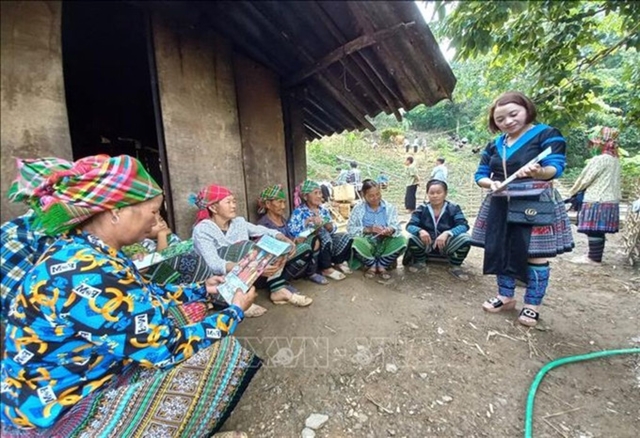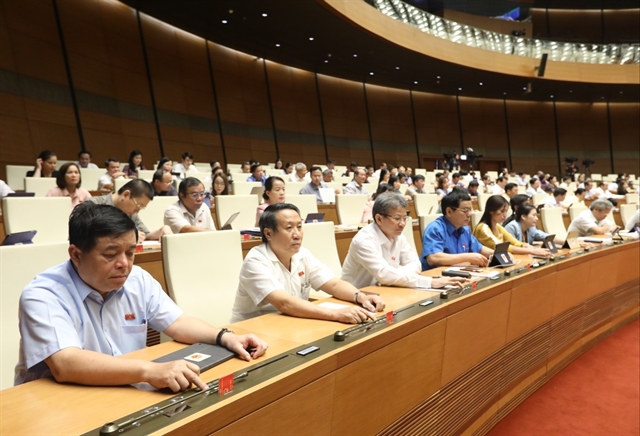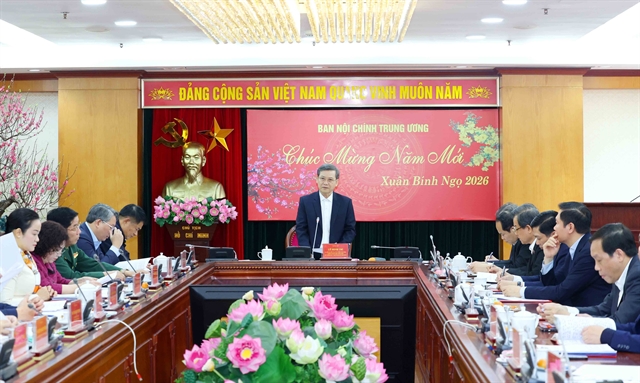 Politics & Law
Politics & Law

Legislators voted to pass a law amending and supplementing some articles of the Law on Natural Disaster Prevention and Control and the Law on Dykes at the ongoing ninth session of the 14th National Assembly (NA) in Hà Nội on Wednesday.

|
| National Assembly on Wednesday in Hà Nội voted on the amendments to the Law on natural disaster prevention and control and the Law on Dykes. VNA/VNS Photo Văn Điệp |
HÀ NỘI — Legislators voted to pass a law amending and supplementing some articles of the Law on Natural Disaster Prevention and Control and the Law on Dykes at the ongoing ninth session of the 14th National Assembly (NA) in Hà Nội on Wednesday.
With 92.34 per cent of votes in favour, deputies agreed to review and adjust the laws.
The law supplements provisions for prioritising allocation of resources for research, development and implementation of science and technology programmes in natural disaster prevention and control.
It also strengthens solutions to overcome consequences of natural disasters, giving priority to training and capacity building training for people working in natural disaster prevention and combatting; providing equipment for natural disaster prevention and fighting at commune-level.
Regarding the Law on Dykes, the new law prohibits construction of houses within the dyke protection area and the area of riverbed except for works to serve flood and storm prevention and combating. The dumping of waste and exploitation of soil and gravel within the dyke protection scope, river banks as well as other activities obstructing flow and flood drainage were also banned.
The law added forest fires starting from natural causes as a type of natural disaster. It also clearly stipulates the authorisation as well as the allocation of relief resources. The regulations on international co-operation were also defined.
Earlier while delivering a report on the law at the NA Standing Committee, Chairman of the Committee of Science, Technology and Environment Phan Xuân Dũng said forest fires originate from natural and man-made causes. The prevention and fight against forest fires have been already stipulated in the forestry law and fire prevention regulation.
However, due to adverse effects of weather, the risk of large forest fires was high, occurring on a large scale and simultaneously in many provinces and cities.
Such regulations do not overlap with the Law on Forestry, the Law on Fire Protection, and overcome the limitations of current regulations when the risk of forest fires is widespread and serious.
The law will take effect from July 1, 2021.
Draft law on international agreements
The NA also debated the draft law on international agreements on Wednesday.
Most NA deputies agreed on the need to enforce the law on international agreements to perfect the legal foundation, contributing to institutionalising the Party’s policies and guidelines on international integration towards higher quality and efficiency. It also dealt with shortcomings of the 2007 ordinance on signing and implementation of international agreements.
However, many deputies were still concerned over giving authority of signing international agreements to People’s Committees at district and commune levels, said Nguyễn Văn Giàu, head of NA’s External Commission.
There are always hidden sensitive issues in politics, foreign affairs, national defence and security in international co-operation which required signatories to have a certain capacity, he said, adding that not all agencies and organisations can sign international agreements.
Deputy Trần Văn Mão from Nghe An Province and Deputy Nguyễn Thanh Xuân from Cần Thơ City proposed the compiling committee review the feasibility of agreements as district and communal authorities have limited capacity.
Some deputies also worried about the possibility that disputes might occur and how to handle them after signing international agreements.
Việt Nam currently has about 11,000 communes, with more than 600 districts. The expanding of signing international agreements to commune level was too large, they said.
Trương Trọng Nghĩa, from HCM City, suggested only certain agencies at provincial level be given signing authority.
The provincial committees would sign the agreements instead of the district or communal level regarding to the signatory of international agreements to limit the risk of petitions, he said.
Construction
Deputies also passed a draft law amending and supplementing articles of the Construction Law.
Lawmakers agreed to reform the administrative procedures for granting construction permits, especially separate housing works in rural areas.
Legislators also suggested tightening the management of construction order, which is directly linked to granting construction permits.
They said construction order management is not only associated with the construction law but also related to the land law, planning, the handling of administrative violations, and the organisation of local governments.
Therefore, it is necessary to clarify the responsibilities of People’s Committees at the district and provincial levels, according to lawmakers. VNS




